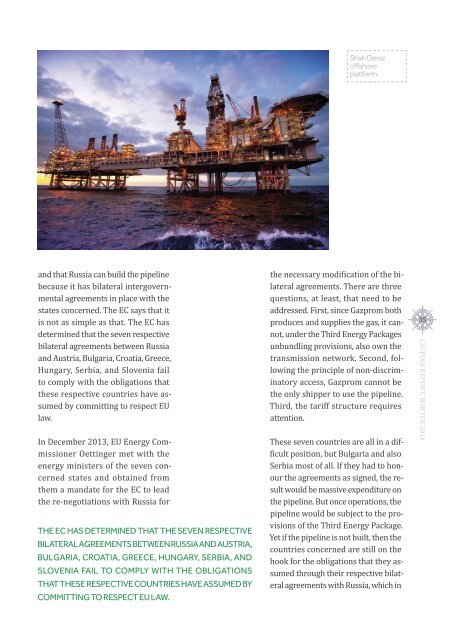Caspian Report - Issue 06 - Winter 2014
Create successful ePaper yourself
Turn your PDF publications into a flip-book with our unique Google optimized e-Paper software.
Shah Deniz<br />
offshore<br />
platform.<br />
and that Russia can build the pipeline<br />
because it has bilateral intergovernmental<br />
agreements in place with the<br />
states concerned. The EC says that it<br />
is not as simple as that. The EC has<br />
determined that the seven respective<br />
bilateral agreements between Russia<br />
and Austria, Bulgaria, Croatia, Greece,<br />
Hungary, Serbia, and Slovenia fail<br />
to comply with the obligations that<br />
these respective countries have assumed<br />
by committing to respect EU<br />
law.<br />
In December 2013, EU Energy Commissioner<br />
Oettinger met with the<br />
energy ministers of the seven concerned<br />
states and obtained from<br />
them a mandate for the EC to lead<br />
the re-negotiations with Russia for<br />
THE EC HAS DETERMINED THAT THE SEVEN RESPECTIVE<br />
BILATERAL AGREEMENTS BETWEEN RUSSIA AND AUSTRIA,<br />
BULGARIA, CROATIA, GREECE, HUNGARY, SERBIA, AND<br />
SLOVENIA FAIL TO COMPLY WITH THE OBLIGATIONS<br />
THAT THESE RESPECTIVE COUNTRIES HAVE ASSUMED BY<br />
COMMITTING TO RESPECT EU LAW.<br />
the necessary modification of the bilateral<br />
agreements. There are three<br />
questions, at least, that need to be<br />
addressed. First, since Gazprom both<br />
produces and supplies the gas, it cannot,<br />
under the Third Energy Packages<br />
unbundling provisions, also own the<br />
transmission network. Second, following<br />
the principle of non-discriminatory<br />
access, Gazprom cannot be<br />
the only shipper to use the pipeline.<br />
Third, the tariff structure requires<br />
attention.<br />
These seven countries are all in a difficult<br />
position, but Bulgaria and also<br />
Serbia most of all. If they had to honour<br />
the agreements as signed, the result<br />
would be massive expenditure on<br />
the pipeline. But once operations, the<br />
pipeline would be subject to the provisions<br />
of the Third Energy Package.<br />
Yet if the pipeline is not built, then the<br />
countries concerned are still on the<br />
hook for the obligations that they assumed<br />
through their respective bilateral<br />
agreements with Russia, which in<br />
35<br />
CASPIAN REPORT, WINTER <strong>2014</strong>










